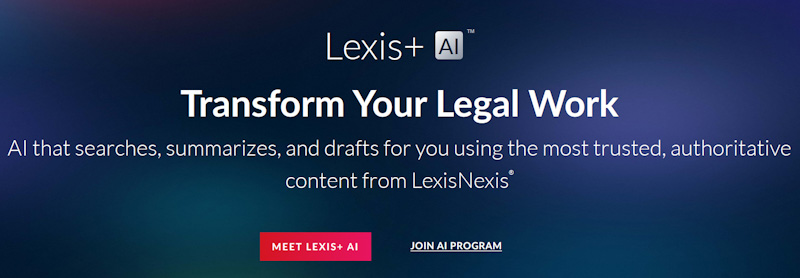LexisNexis announces new generative artificial intelligence platform

Screenshot from LexisNexis.
Legal research company LexisNexis became the latest adopter of generative artificial intelligence in the legal industry Thursday by rolling out a new platform for case research and document drafting.
The new software, called Lexis+ AI, boasts a simple interface and user experience that mirrors OpenAI’s popular platform ChatGPT.
Jeff Pfeifer, the chief product officer for LexisNexis in the United Kingdom and North America, says the new platform is built on multiple large language models, including GPT.
Like ChatGPT, the AI responds in a matter of seconds to prompts and can draft summaries, legal documents and communications. The platform also provides citations, including relevant caselaw, authorities and guidance, and allows users to copy and save generated text entries into separate folders.
Lexis+ AI was trained on a data set that includes LexisNexis’ database, according to a May 4 news release. To develop the platform, the company said it is drawing on feedback from Am Law 50 firms, including Baker McKenzie, Reed Smith and Foley & Lardner.
Since the release of OpenAI’s ChatGPT in November, there has been an explosion of interest in generative AI, and it is expected to transform the industry and streamline many time-consuming legal tasks, including research, document drafting and client communications.
However, platforms such as ChatGPT can be unreliable and give inaccurate “hallucinating” answers, as well as citations and sources.
Pfeifer says there’s no generative AI platform that is “hallucination-free.” But he says LexisNexis’ focus has been on “ensuring the absolute minimum hallucination rate possible.”
“We’ve talked to lawyers all over the country. One of their biggest experiences with ChatGPT, for example, is noting citations that don’t exist. We control for that by ensuring that citations that are presented are actually sourced from an authoritative opinion,” he says.
Data, security, privacy and client confidentiality are also issues that are top of mind for lawyers as they consider adopting generative AI platforms, Pfeifer adds.
“The deployment of the technology is focused on building private model interactions, where there is no risk of a user interaction being subsumed into a wider model or where any users’ information can flow to another user of our service,” Pfeifer says. “We partner with major cloud providers like Microsoft and [Amazon Web Services] in order to ensure that our infrastructure is completely private.”
Others in the legal industry have been quick to adopt generative AI to gain a competitive edge. Allen & Overy is using a platform called Harvey. In March, PwC also announced a global partnership with Harvey, which is backed by an OpenAI startup fund. That same month, CaseText launched CoCounsel, which is also powered by OpenAI technology. Many other legal technology companies are integrating generative AI into their products.
This week, Thomson Reuters, parent of the Westlaw legal research service, said it will invest $100 million per year in the technology and integrate generative AI into its products later this year.



